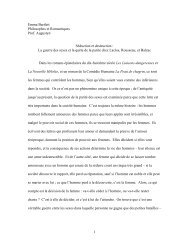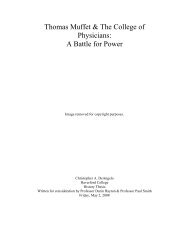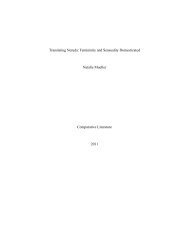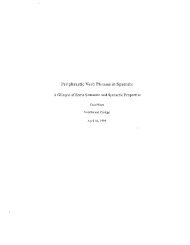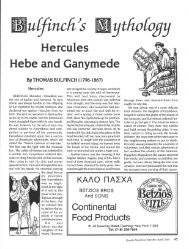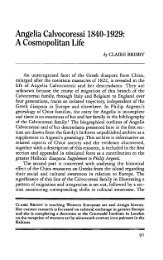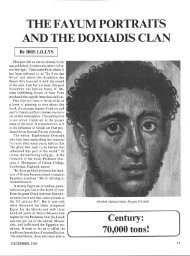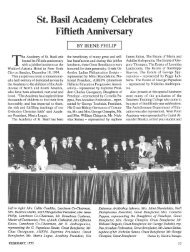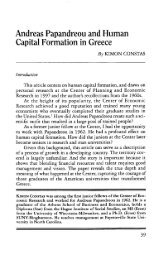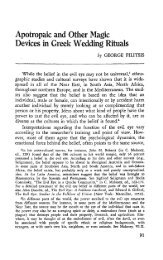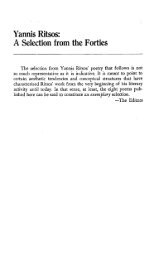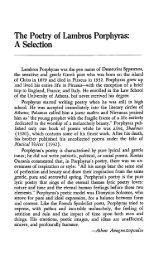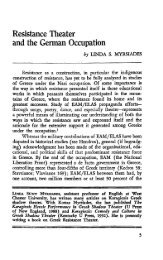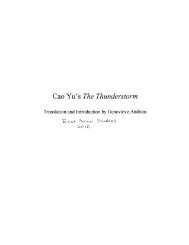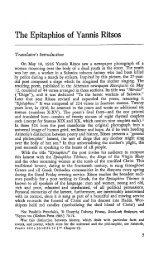Mythistorema - Triceratops Home
Mythistorema - Triceratops Home
Mythistorema - Triceratops Home
Create successful ePaper yourself
Turn your PDF publications into a flip-book with our unique Google optimized e-Paper software.
44 JOURNAL OP THE HELLENIC DIASPORA<br />
The identity of the people who departed remained very ambiguous<br />
for some time because the poem starts with the statement "We never<br />
knew them," which is then changed to "We saw them twice perhaps"<br />
and is further modified by the information that this is something that<br />
happened in childhood. Robert Levesque, the French critic and translator<br />
of Seferis' poems, discussed this subject with the poet, and in his introduction<br />
to the French translation provides some revealing information<br />
about it. In order to understand the situation described in the poem, at<br />
least on the personal level, it is necessary to refer to the events taking<br />
place in the Smyrna area at the time of the Balkan Wars (1912-1913).<br />
The Greeks living there were persecuted, and the bravest among them<br />
risked everything in order to reach Greece and join the fight against the<br />
Turks. The poet's father, a prominent Greek of Smyrna, helped several of<br />
them escape, and the young Seferis witnessed the nocturnal departures of<br />
Greek patriots who had passed from his house on their way to their<br />
secret mission. These figures acquired mythical proportions in his imagination,<br />
and in his memory the myth blends with their dream for a<br />
Greece that would recapture its lost territory and its past glory. The loss<br />
of these people and of this dream in the Asia Minor disaster of 1922<br />
was a trauma that left indelible marks on the poet's personality. When<br />
he wrote <strong>Mythistorema</strong>, years after the disaster, the departure of these<br />
heroic figures blended in his memory with the loss of all his childhood<br />
friends, and perhaps also a love of his youth among them, in the destruction<br />
of his hometown, Smyrna, as suggested by the recurring motif of<br />
the dead friends throughout his poetry.<br />
The journey blends with love at the end of the poem. These memories<br />
torment his imagination, and he becomes confused and uncertain as he<br />
thinks that perhaps he never saw these persons, that it may all have been<br />
a hallucination, a dream "at the time sleep still/Was leading [him)<br />
close up to the breathing wave." Perhaps he looks for them because he<br />
is "looking for/ The other life that is beyond the statues,"" for the spell<br />
of a lost paradise.<br />
6<br />
Poem "6" of <strong>Mythistorema</strong> has as an epigraph the initials M.R.,<br />
which are those of Maurice Ravel, the French composer to whom Seferis<br />
addresses these lines and who is most probably the "old Friend" referred<br />
to in the last line of the first stanza.<br />
33Here, "beyond the statues" refers to a past happiness, before the protagonist<br />
felt alienated as if turning into stone. The reasons for this process are presented<br />
in the sections 'Wednesday" and, more particularly, "Sunday" of the "Notes for<br />
a Week," where people become mutilated statues. As already mentioned, stones<br />
and statues are very complex symbols in Seferis, and they will be further discussed<br />
in connection with poems "18," "20" and "21" of <strong>Mythistorema</strong>.



